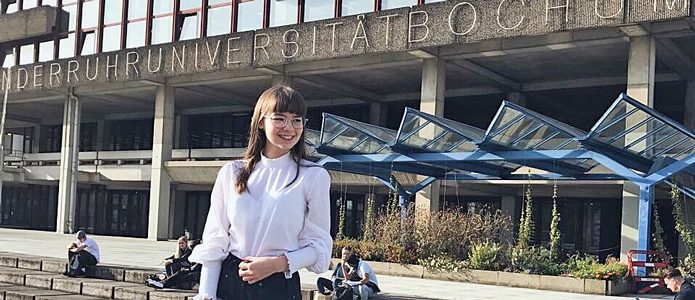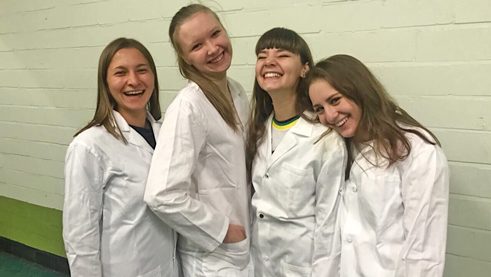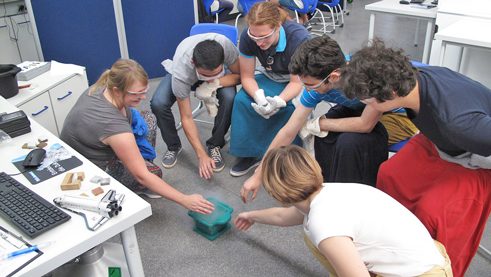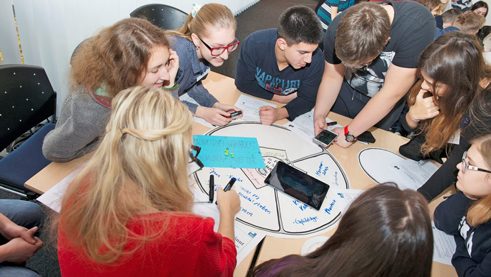Studienbrücke Educational Programme
Education with No Detours

In cooperation with the Alliance of Ruhr Universities, the DAAD and other partner universities in Germany, the Goethe-Institut is preparing international school graduates in as yet 18 countries to study at a German partner university. In order to further expand the Studienbrücke (bridge to studies) in future, the Goethe-Institut, the UA Ruhr and the DAAD are signing a Memorandum of Understanding. Anastasiia Sliusar, a successful alumna of the Studienbrücke from Russia, shares her personal experiences with The Latest at Goethe.
What attracted you to studying in Germany?
My former school in Russia worked with partner schools from Germany. That led to contacts with German teachers who told us a lot about life and education in Germany. For example, the conditions for studying and how well equipped universities in natural sciences are and the good research opportunities their labs offer. Since I’d like to work in the natural sciences, I was very excited about the prospect of conducting research in these laboratories. When I finally explored my career aspirations, I decided not only to obtain information about Russian universities but also about German universities. That’s how I heard about the Studienbrücke programme.
 Former Studienbrücke alumni heading to their chemistry seminar at Ruhr University Bochum
| Photo: Anastasiia Sliusar
Former Studienbrücke alumni heading to their chemistry seminar at Ruhr University Bochum
| Photo: Anastasiia Sliusar
Help getting started in Germany
What hopes and dreams did you have about studies and life in Germany? Did they come true?My desire to work in well-equipped laboratories definitely came true. Practical exercises begin in the first semester at the Ruhr University Bochum. This makes it easier for students to decide on a future profession. In addition, life and living quarters are very well linked to the university. The various faculties, the dorms and the shops are close to and within walking distance of each other. It’s not like that in Kaliningrad; there, the dormitories are at the other end of the city and the faculties are scattered all over.
Why did you decide to participate in the Studienbrücke?
My German teacher who was also working at the Goethe-Institut advised me to take part in the Studienbrücke. She thought I would be a suitable candidate and explained to me that with the help of the Studienbrücke I could start studying in Germany directly after my school graduation. The programme would prepare me not only with the scientific terminology but also interculturally for life and study in Germany. For me personally, that was a crucial line of reasoning. Because the idea of going to another city, to a completely different country and do it all alone worried me at first – to be honest it frightened me. But when I found out that the Studienbrücke helps us students to prepare for and start our studies and supports us in various ways, it was a huge relief. That suddenly made my decision to study in Germany much easier. For me, it was also important that I could take this pathway together with other school graduates who were pursuing similar ideas and goals.
 Joint experiments at the TU Dortmund
| Photo: Technische Universität Dortmund
Joint experiments at the TU Dortmund
| Photo: Technische Universität Dortmund
All-round training
Was the Studienbrücke good preparation for studies in Germany? If so, what was particularly helpful?Participating in the Studienbrücke was valuable for me at multiple levels. During our lessons at the Goethe-Institut, we not only practiced German grammar and vocabulary, but also went into scientific texts. So we were already prepared for the scientific context and could train our vocabulary. We also learned how to write good applications. And we gained insights into the higher education system in Germany and got to know the institution better. The STEM academy on studying at universities of the UA Ruhr was also an important part for me personally during preparations. We got to know three universities from the ground up and my hopes about life on campus and the well-equipped laboratories were confirmed. The coordinators of the Studienbrücke, who we could turn to with any questions and concerns, were particularly helpful. I am so very grateful for their help. They have an incredibly important role to play in the programme, and were decisive for me and many others making the decision to participate in the Studienbrücke. I also recommended this programme to my younger sister. She wants to study engineering. My contacts with fellow students studying mechanical engineering and engineering enabled me to tell my sister about their diverse experiences.
 E-learning at the STEM Academy of Ruhr University Bochum
| Photo: Ruhr-Universität Bochum
What do you want to do when you finish your Bachelor’s degree?
E-learning at the STEM Academy of Ruhr University Bochum
| Photo: Ruhr-Universität Bochum
What do you want to do when you finish your Bachelor’s degree?I’d like to continue my studies in Germany and hope to get my Master’s. After graduating in biology, I could well imagine specialising in neurobiology or embryology.